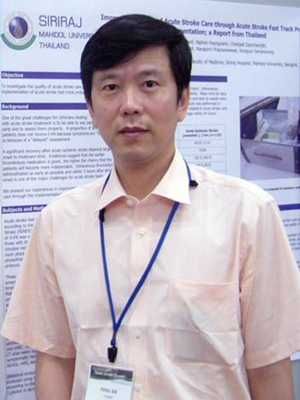Peng Xie
Affiliations: | Department of psychiatry | Chongqing Medical University, Chongqing, China |
Area:
DepressionWebsite:
http://www.xiepengteam.cn/Google:
"Peng Xie"Mean distance: (not calculated yet)
BETA: Related publications
See more...
Publications
|
You can help our author matching system! If you notice any publications incorrectly attributed to this author, please sign in and mark matches as correct or incorrect. |
| Han S, Tian Y, Zheng R, et al. (2024) Shared differential factors underlying individual spontaneous neural activity abnormalities in major depressive disorder. Psychological Medicine. 1-19 |
| Zhu J, Chen X, Lu B, et al. (2024) Transcriptomic decoding of regional cortical vulnerability to major depressive disorder. Communications Biology. 7: 960 |
| Chen X, Mo X, Zhang Y, et al. (2024) A comprehensive analysis of the differential expression in the hippocampus of depression induced by gut microbiota compared to traditional stress. Gene. 927: 148633 |
| Pu J, Yu Y, Liu Y, et al. (2024) ProMENDA: an updated resource for proteomic and metabolomic characterization in depression. Translational Psychiatry. 14: 229 |
| Lou F, Luo S, Kang N, et al. (2024) Oral microbiota dysbiosis alters chronic restraint stress-induced depression-like behaviors by modulating host metabolism. Pharmacological Research. 107214 |
| Tan X, Wu J, Zhang H, et al. (2024) Biogeography of intestinal mucus-associated microbiome: Depletion of genus Pseudomonas is associated with depressive-like behaviors in female cynomolgus macaques. Journal of Advanced Research |
| Xie P, Zhou X, Li Y, et al. (2024) Gut microbial CAZymes markers for depression. Translational Psychiatry. 14: 135 |
| Xu K, Ren Y, Zhao S, et al. (2024) Oral D-ribose causes depressive-like behavior by altering glycerophospholipid metabolism via the gut-brain axis. Communications Biology. 7: 69 |
| Sun L, Zhao T, Liang X, et al. (2023) Functional connectome through the human life span. Biorxiv : the Preprint Server For Biology |
| Sun X, Sun J, Lu X, et al. (2023) Mapping Neurophysiological Subtypes of Major Depressive Disorder Using Normative Models of the Functional Connectome. Biological Psychiatry |
